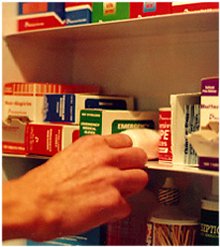 A new study suggests that aspirin and other non-steroidal anti-inflammatory drugs (NSAIDs) may be beneficial for prostate cancer sufferers, and, may also offer a protective effect in men without the disease, say researchers at Vanderbilt University.
A new study suggests that aspirin and other non-steroidal anti-inflammatory drugs (NSAIDs) may be beneficial for prostate cancer sufferers, and, may also offer a protective effect in men without the disease, say researchers at Vanderbilt University. Specifically, the study found that aspirin and other NSAIDs lowered levels of prostate specific antigen (PSA). A PSA test is used widely as a method to screen men for the possibility of prostate cancer, with higher blood PSA levels suggesting a greater chance of having prostate cancer. High PSA levels can also signify benign prostatic hyperplasia (BPH), a non-cancerous enlargement of the prostate organ.
The study involved 1,277 participants and after adjusting for age, race, family prostate cancer history, obesity, and other variables, the researchers found that aspirin use was significantly associated with lower PSA levels. PSA levels were 9 percent lower in men taking aspirin (the NSAID most commonly used) compared with men who did not use aspirin.
"To begin to understand how aspirin may lower PSA, we also looked at the association between NSAID use and prostate volume," said lead investigator Jay H. Fowke. "Aspirin users and men who didn't use aspirin had the same prostate volume, so I don't think aspirin was changing PSA by changing the prostate volume. It was doing something different, and that suggests a beneficial effect on cancer development. Furthermore, the effect of aspirin on PSA was only somewhat evident among men without prostate cancer but was strongest in men later found to have prostate cancer. This also suggests an effect on cancer as opposed to other prostate diseases."
"There are several ways to consider the impact of these results," said Dr. Fowke. "Several prior studies reported anti-inflammatory drugs like NSAIDs were associated with lower prostate cancer risk. Our data also suggest that NSAID use has a beneficial effect on prostate cancer. These findings could be consistent with a protective effect, because aspirin reduced PSA levels more among those men who were diagnosed with prostate cancer than among men with other prostate diseases."
But the data could also indicate that NSAID use could affect our ability to detect prostate cancer, regardless of any reduction in prostate cancer risk. "This analysis raises the concern that aspirin and other NSAIDs may lower PSA levels below the level of clinical suspicion without having any effect on prostate cancer development, and if that is true, use of these agents could be hampering our ability to detect early-stage prostate cancer through PSA screening," Fowke pointed out.
It is also possible that results from prior studies suggesting that NSAID use reduced prostate cancer risk may just be picking up a reduced ability to detect prostate cancer among NSAID users.
"It will be important to understand which mechanism is in play because many men take NSAIDs for their cardiovascular health, so we need to know whether that reduces their prostate cancer risk, or simply reduces PSA, which would then be even less reliable as a marker of prostate cancer risk," Dr. Fowke concluded.
Related:
An Aspirin A Day To Keep Prostate Cancer Away?
Experts Express Doubts Over Effectiveness Of PSA Tests
Cholesterol Lowering Drugs Appear To Aid Prostate Treatment
Replacement For PSA Test Mooted
Source: American Association for Cancer Research

